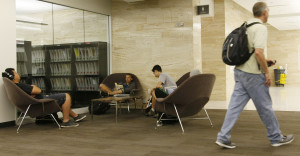Bed bugs were a serious problem for the U’s Marriott Library two years ago, but now staff says that, with monthly check-ups, it’s not likely to be a recurring one.

Ian Godfrey, director of library facilities, said the university has partnered with a local pest control company to monitor and treat for bed bugs. This includes monthly visits from trained dogs to sniff and check for the pests and an organic control chemical to keep the surfaces of the library inhospitable to the bugs.
“I have every confidence in our vendor and their ability to keep the Marriott Library bed bug-free,” Godfrey said. “The bed bug episode was two years ago, and we feel confident that it is a part of the library’s past.”
Jessica Arthurs, a junior in political science, said she learned of the bed bug problem through other students.
“It’s disgusting,” she said. “It showed a really sanitary concern among students and those who run the library.”
Godfrey said the source of the bed bugs two years ago was impossible to trace because the library receives around 1.8 million visitors annually. According to the National Pest Management Association, they are one of the most common pest infestations and occur everywhere crowds gather.
John Longino, a biology professor with a specialty in entomology, said the recent rise in bed bug infestations likely has to do with a national shift in cleaning habits.

“We quit using nasty chemicals in our houses,” Longino said. “Some of the hyper-cleanliness behavior of Americans in the 1950s and 60s might have been inspired in clearing bed bugs, but things have gotten a little more lax; you don’t change the bed sheets as often, or you let things pile up in corners.”
Bed bugs are also resistant to most pesticides, which may contribute to their resurgence. Arthurs worries that because of this there’s a chance this could happen again at the U.
“You don’t know what goes on in other people’s homes, and it’s so easily transferable,” she said.
Bed bugs transfer from one place to another because they’re small and can go lengthy times between meals.
“They get carried around in stuff, they live in little clusters back in nooks and clusters and come to feed at night,” Longino said. “So they can set up house in a desk lamp and you pack up that lamp and take it to your new dorm and there you have another infestation.”
Bed bugs don’t carry diseases and aren’t poisonous, according to the Centers for Disease Control and Prevention, but they are an annoyance. The insects are parasites and bite humans, which can cause a slight allergic reaction.
k.ehmann@dailyutahchronicle.com
@ehmannky

